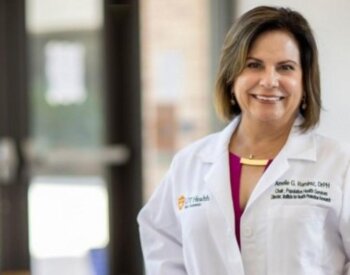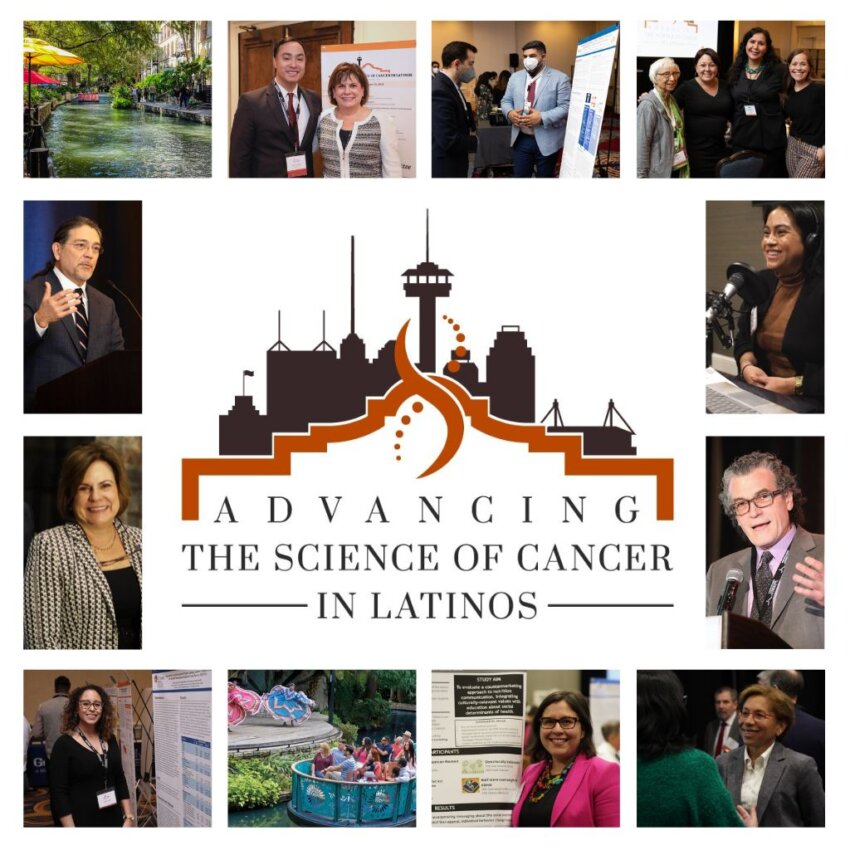‘Advancing the Science of Cancer in Latinos’ conference aims to
address cancer disparities and health inequities Feb. 21-23
Contact: Cliff Despres, 210-616-1024, despres@uthscsa.edu
SAN ANTONIO, Feb. 19, 2024 — To spur solutions to the heavy burden of cancer among Latinos, The University of Texas Health Science Center at San Antonio (UT Health San Antonio) is hosting the 4th biennial “Advancing the Science of Cancer in Latinos” conference Feb. 21-23 at the Marriott Riverwalk in San Antonio.
Cancer is the top cause of death for Latinos, who have higher rates than their peers for cervical, stomach and liver cancers, and worse outcomes for other cancer types.
Advancing the Science of Cancer in Latinos is expected to draw more than 250 researchers, doctors, community leaders, patient advocates and students for an open dialogue on translating the newest research advances into clinical best practices, effective community interventions, system-change advocacy and professional training to eliminate cancer disparities in Latinos.
Experts from the National Cancer Institute, National Institutes of Health and more are among the guest speakers.
Media is invited to attend.

“Advancing the Science of Cancer in Latinos is where we can come together and find equitable solutions for cancer prevention, treatment and survivorship among Latinos,” said Amelie Ramirez, DrPH, MPH, who founded the conference and directs UT Health San Antonio’s Institute for Health Promotion Research (IHPR) and Salud America! program. The IHPR will co-host the conference with the Mays Cancer Center at UT Health San Antonio.
The 2024 Advancing the Science of Cancer in Latinos conference is the newest in a biennial conference series that has attracted more than 800 researchers and featured more than 200 research posters with innovations in Latino cancer research, education and training. View the conference proceedings from 2018, 2020 and 2022 for details.
At 19.1% of the U.S. population, Latinos are the largest racial/ethnic group.
Although there has been substantial progress in cancer prevention, screening, diagnosis and treatment over past decades, advancement in addressing cancer disparities has not kept pace.
Latinos face a 142% rise in cancer cases in the coming years, and cancer accounts for 20% of deaths among Latinos.
“Our conference will unpack the various reasons for Latino cancer disparities – from structural inequities and a lack of representation in health care to data collection and climate change – so that we can reduce Latinos’ risk for cancer, advance precise treatments and improve their quality of life should they be diagnosed,” Ramirez said.
Advancing the Science of Cancer in Latinos speakers from Feb. 21-23 include:
- Eliseo J. Pérez-Stable, MD, National Institute on Minority Health and Health Disparities at the National Institutes of Health. He will focus on individual and systemic solutions to address inequities among Latinos across cancer care.
- Gary L. Ellison, PhD, MPH, National Cancer Institute. He will explore how climate change and natural disasters are disrupting cancer screening and treatment, especially for Latinos.
- Yolanda Sanchez, PhD, University of New Mexico Comprehensive Cancer Center. Sanchez, the first Latina to lead an NCI-Designated Cancer Center, will talk about reducing the Latino cancer burden via transdisciplinary research.
- James H. Doroshow, MD, National Cancer Institute. He will delve into inclusiveness in clinical trial research.
- Shoba Srinivasan, PhD, National Cancer Institute. She will explore ways to reduce poverty and cancer.
- Elena V. Rios, MD, MSPH, National Hispanic Medical Association. Rios, representing 50,000 U.S. Hispanic physicians, will cover the public policy implications of Latino cancer.
“These and other presenters will unveil Latino-focused lab research, clinical best practices and community interventions to stimulate multidisciplinary collaborations for cancer solutions that touch on genetics, biological differences, access to care, screening tests, incidence and mortality rates, survivorship, advocacy and health equity,” Ramirez said.
The conference planning committee is led by co-chairs Ramirez and Edward J. Trapido, ScD, FACE, Louisiana State University. The rest of the committee includes:
- Barbara Segarra-Vázquez, DHSc, MT, University of Puerto Rico.
- Alejandro Recio Boiles, MD, FACP, University of Arizona.
- Maria Constanza Camargo, National Cancer Institute.
- Filipa C. Lynce, MD, Harvard University.
- Gerardo Colon-Otero, MD, Mayo Clinic, Florida.
- Katherine Y. Tossas, PhD, Virginia Commonwealth University.
- Laura Fejerman, PhD, MSc, University of California, San Francisco.
- Mariana C. Stern, PhD, University of Southern California.
- Martin Mendoza, PhD, Director of Health Equity, All of Us Research Program.
- Matthew P. Banegas, PhD, MPH, University of California, San Diego.
- Patricia I. Moreno, PhD, Miami University.
- Sandi Stanford, Alamo Breast Cancer Foundation.
Conference sponsors include: Amgen, AstraZeneca, Bristol Myers Squibb, Genentech, Gilead (platinum); GMaP Region 3, Loxo@Lilly, National Cancer Institute, Pfizer, Regeneron (silver); Arizona Comprehensive Cancer Center, Sylvester Comprehensive Cancer Center, UCSD Moores Cancer Center in partnership with UCSD Center for Health Equity Education, VCU Massey Comprehensive Cancer Center (amigos).
Also, on Feb. 20, the day before the Advancing the Science of Cancer in Latinos begins, the conference will host the first-ever Hispanic/Latino Cancer Patient Advocate Training Program.
The program, led by Barbara Segarra-Vázquez, DHSc, MT, of the University of Puerto Rico, and Sandi Stanford of the Alamo Breast Cancer Foundation, is a day-long event to guide 20 Latinos to become patient advocates, ensuring the voice of the Latino cancer patient is ever-present in research, training, and outreach programs across the country. Each patient advocate will then attend the Advancing the Science of Cancer in Latinos conference to enhance their knowledge of Latino cancer. Program sponsors include Exact Sciences, Pfizer and Susan G. Komen.
“Our committee and sponsors are excited to celebrate research advancements to date, explore new frontiers and gaps in this emerging transdisciplinary field, and kick-start discussion on research from bench to bedside to patient advocacy and survivorship,” Ramirez said.
For more information and to register, visit LatinoCancer.com or email LatinoCancer@uthscsa.edu.
The conference hashtag is #LatinoCancer2024.
The University of Texas Health Science Center at San Antonio (UT Health San Antonio) is one of the country’s leading health science universities and is designated as a Hispanic-Serving Institution by the U.S. Department of Education. With missions of teaching, research, patient care and community engagement, its schools of medicine, nursing, dentistry, health professions, graduate biomedical sciences and public health have graduated more than 42,550 alumni who are leading change, advancing their fields and renewing hope for patients and their families throughout South Texas and the world. To learn about the many ways “We make lives better®,” visit UTHealthSA.org.
Stay connected with The University of Texas Health Science Center at San Antonio on Facebook, Twitter, LinkedIn, Instagram and YouTube.
The Institute for Health Promotion Research (IHPR) investigates the causes of and solutions to the unequal impact of cancer, chronic disease and obesity among Latinos in San Antonio, South Texas and the nation. The IHPR, founded in 2006, is based at The University of Texas Health Science Center at San Antonio.
The Mays Cancer Center at UT Health San Antonio is one of only four National Cancer Institute-designated Cancer Centers in Texas. The Mays Cancer Center provides leading-edge cancer care, propels innovative cancer research and educates the next generation of leaders to end cancer in South Texas. To learn more, visit https://cancer.uthscsa.edu.
Stay connected with the Mays Cancer Center on Facebook, Twitter, LinkedIn, Instagram and YouTube.


